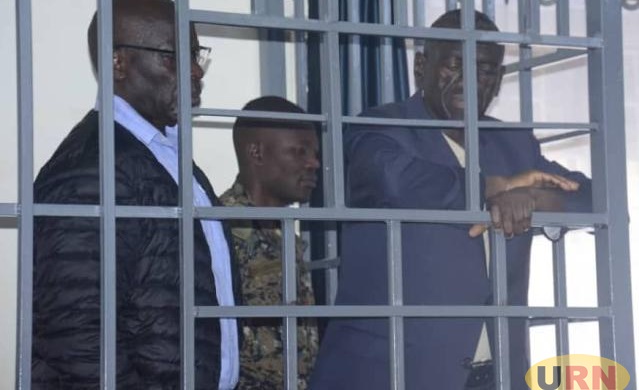
KAMPALA, UGANDA | THE INDEPENDENT | Opposition politician Retired Col. Dr. Kizza Besigye has declined to take a plea on an amended charge sheet, which includes new charges of treason against him and two others. The co-accused are Hajji Obeid Lutaale Kamulegeya and Captain Denis Oola, a serving UPDF officer attached to the Armoured Brigade. Oola was added to the case as part of the amendment.
The amended charge sheet was presented before the court by Col. Raphael Mugisha, who led a team of five prosecutors. Shortly after its admission into the court record, Besigye, through his lawyers, led by Martha Karua and Erias Lukwago, objected to taking a plea. They argued that there was a pending ruling regarding whether the court had jurisdiction to try offenses reportedly committed outside Uganda.
The lawyers noted that an amendment could not come at this stage while a ruling is pending, also challenging the trial of civilians in the Court Martial. The court took a break to check its records to confirm whether the ruling had already been delivered or was still pending. Upon reconvening, the Court Martial, led by Brigadier Robert Freeman Mugabe, stated that a ruling regarding the trial of civilians had already been delivered on the day Besigye and Lutaale were charged, November 20, 2024.
They clarified that the pending ruling concerned territorial jurisdiction, which they intended to deliver but had not yet done due to several issues raised by the defense lawyers. Judge Advocate Brigadier Richard Tukacungurwa emphasized that the principles of civil courts should be observed, even in the Court Martial. He ruled that the law on amendments to charges is clear: a charge sheet can be admitted if no injustice will be caused to the accused.
Tukacungurwa further stated that an amendment could be made during proceedings if it would not cause injustice. Since the hearing had not yet started, the court allowed the amendment of the charges against Besigye and Lutaale. Shortly after, the court clerk asked the three accused—Besigye, Lutaale, and Captain Oola—if they had any objections to being tried by the panel of seven members led by Brigadier Mugabe. As is customary at the start of a new case, Besigye asked the panel members to introduce themselves so he could be familiar with them.
Once this was done, the court, presided over by Mugabe, began reading the charges against the trio. He first read count one, “Offenses Related to Security.” The court heard that the particulars were that Captain Oola, Dr. Kizza Besigye, and Lutaale, between February 2023 and November 2024, in Geneva, Switzerland, Athens, Greece, and Nairobi, Kenya, as well as other locations in Uganda, held meetings aimed at soliciting logistical support and identifying military targets in Uganda, with the intent to undermine the security of the Defence Forces.
Mugabe then asked the accused to plead to the charges, whether guilty or not guilty. Besigye, being the prime suspect and listed first on the case file, was asked to respond. He declined to state whether he was guilty or innocent of the charges. “I have heard and responded to taking a plea, and I have raised my objections through my lawyers,” said Besigye.
The lawyers and court then engaged in a debate about various legal procedures, which ultimately prevented the court from reading the details of the subsequent charges. Lawyer Fredrick Mpanga suggested that while the objections might be repetitive or familiar from previous proceedings, the accused were within their legal rights and asked the court to be patient.
Erias Lukwago then took the floor to challenge the territorial jurisdiction of the UPDF Court Martial to try offenses reportedly committed outside Uganda. Lukwago argued that there is no way the UPDF could claim ownership of all the guns and ammunition in Switzerland, Greece, and Nairobi. He stated that in order for the court to try offenses beyond its jurisdiction, the accused would have to be proven as fugitive criminals, which the state had not established.
Lukwago further argued that this process must be preceded by a formal extradition or deportation order, which would be a violation of both international and national laws. Therefore, he argued that the trial should be declared a nullity. Lukwago added that individuals who commit crimes in foreign countries can be tried within those countries or deported to their countries of origin, but there was no deportation order or extradition warrant in this case. He contended that the accused were illegally brought back to Uganda, and the charges violated both national and international law.
Martha Karua, for her part, stated that the accused should have been presented in a court in Nairobi, where they could have had a fair hearing. She questioned what would happen if the arms in question belonged to the government of Kenya, asking if the UPDF would still have jurisdiction. Karua also mentioned that she would present evidence to prove that Nairobi is not in Uganda.
Proceedings are still underway, with Besigye and Lutaale facing the court audience from the same side of the dock, while Captain Oola is isolated behind them, also viewing the proceedings from a different angle but within the same dock.
*****
URN
 The Independent Uganda: You get the Truth we Pay the Price
The Independent Uganda: You get the Truth we Pay the Price



